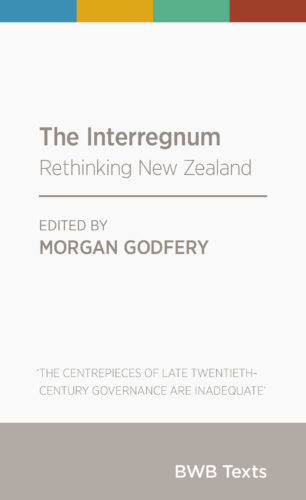
This reading carries on from here.
The fifth essay in The Interregnum is ‘Welfare and Precarious Work’ by Chloe King.
Unlike the other offerings so far, this essay actually resonates with people who are working class. Instead of waffling on about climate change and other shibboleths of the global elite classes, King focuses on real issues that affect real Kiwis: poor wages, poor security of work and a pitiful excuse for a social safety net.
This essay uses anecdotal examples of young Kiwis trying to make it in a workplace that is forcing them into ever worse conditions. The nature of work in New Zealand is becoming ever more stressful as things like the 90-day firing law undermine employment security, and the essay does a good job of showing how this leads to increased rates of mental illness.
It also correctly draws attention to the cruelty of the Fifth National Government. Paula Bennett’s welfare reforms now force people seeking a benefit to fill out a 48-page form of questions – obviously a considerable challenge to the kind of person whose literacy levels place them in precarious economic positions.
King also speaks to a very real sense of outrage when she writes about how mentally ill people are often bullied back into the workforce well before they are ready – a short-sighted approach whose shortcomings become obvious when the inevitable next mental breakdown occurs.
Describing something she calls “constricted choice”, King details a very real problem in the modern workforce: our choice of jobs has increased, but the average quality of those jobs has plummeted, meaning that Kiwis are essentially forced into taking poorly paid work out of duress. The fact that we have a wide choice of crap jobs doesn’t actually make it any better.
Ultimately, King hits the bulls-eye when she states simply that “Workers deserve to be paid fairly and treated with dignity and respect.” She is right when she points out that the nature of workplace relations in New Zealand have deteriorated to the point where the emphasis is on coercing workers into obedience rather than encouraging them.
The “politics of selfishness” is a very real thing, especially in New Zealand, and King rightly points out that she’s not asking for much when she posits that “no-one should work and be poor at the same time.” It’s not much to ask for, but we’re still not getting it, and the essay concludes with a call to collective action.
In summary, Chloe King’s piece strikes much harder and more accurately at the heart of the issue than the previous efforts in this book: poor living and working conditions right here, right now, not vague threats of what might happen in 50 years’ time. It is easy to get the impression that the left is going to do much better by proposing a universal basic income than it is by going on about climate change, and so for their sake they’d do better promoting voices like King’s.
